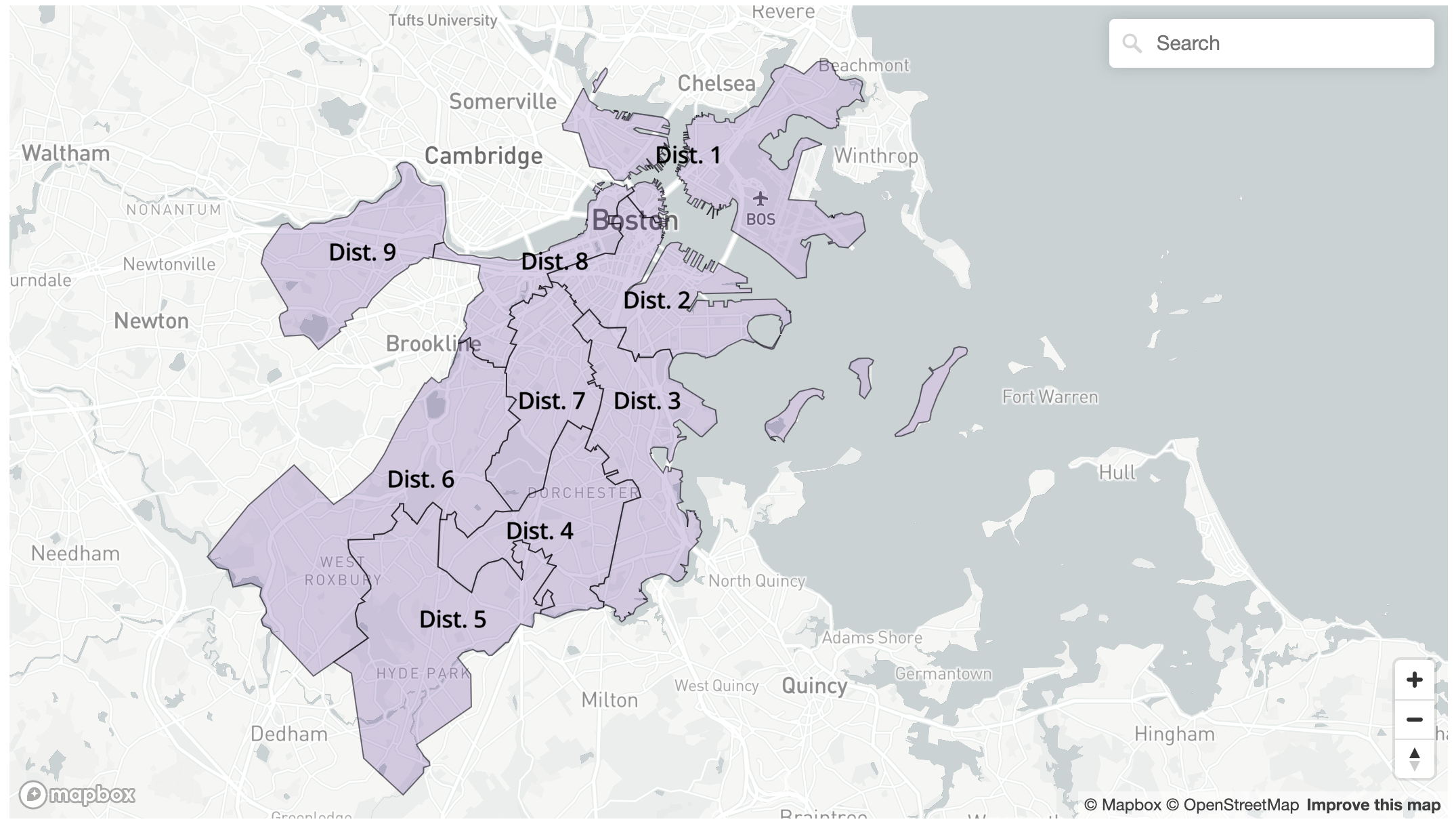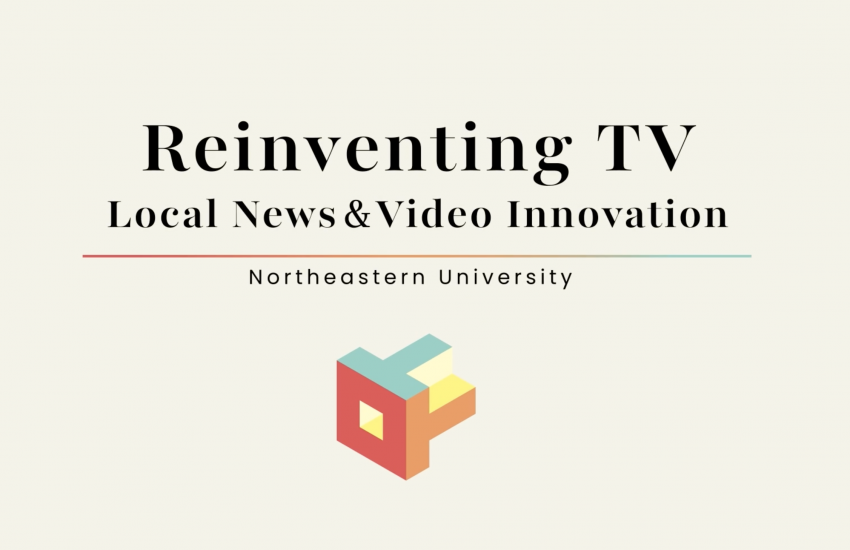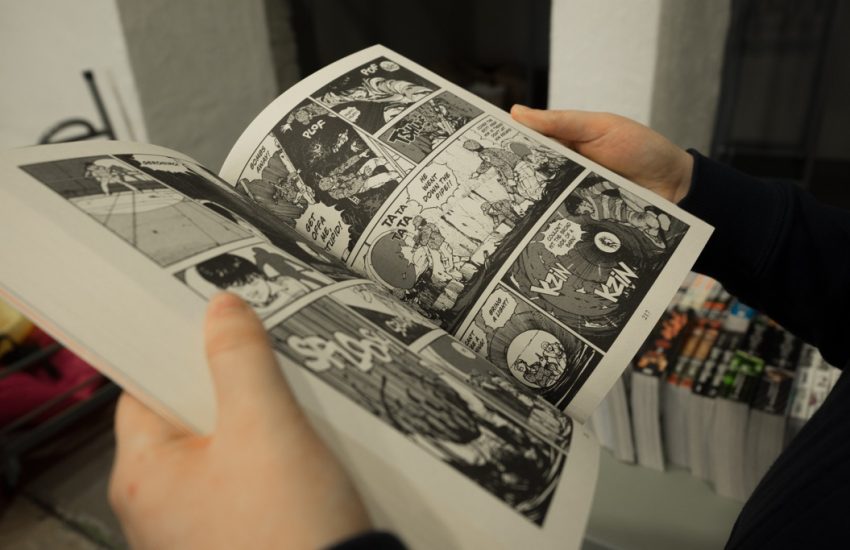How The Scope mapped their way to accessible 2021 Boston election coverage
This year’s Boston mayoral and city council election is being covered in new, dynamic and interactive ways by Boston-based digital experimental magazine, The Scope.
Using engaging data visualizations, The Scope has created two accessible and interactive maps within their “A Guide to Boston’s 2021 Mayoral & City Council Race” piece by reporter Ha Ta to inform readers about voting districts as well as city council and mayoral candidates. Voters can find their voting districts, see candidate information and follow the current election cycle.
The Scope is an editorially independent publication operated by Northeastern University’s School of Journalism that centers stories of justice, hope and resilience from communities in the Greater Boston area. It is a supplemental journalism platform committed to fair reporting that fills in the gaps of mainstream news publications.
Data visualization organizes difficult-to-understand information in easily digestible ways while prioritizing accessibility. “A Guide to Boston’s 2021 Mayoral & City Council Race” features two main data visualization tools — a “District Candidates” tool that allows users to click individual districts and see which candidates are running and a “Find Your District” tool that allows users to locate districts by typing in an address.
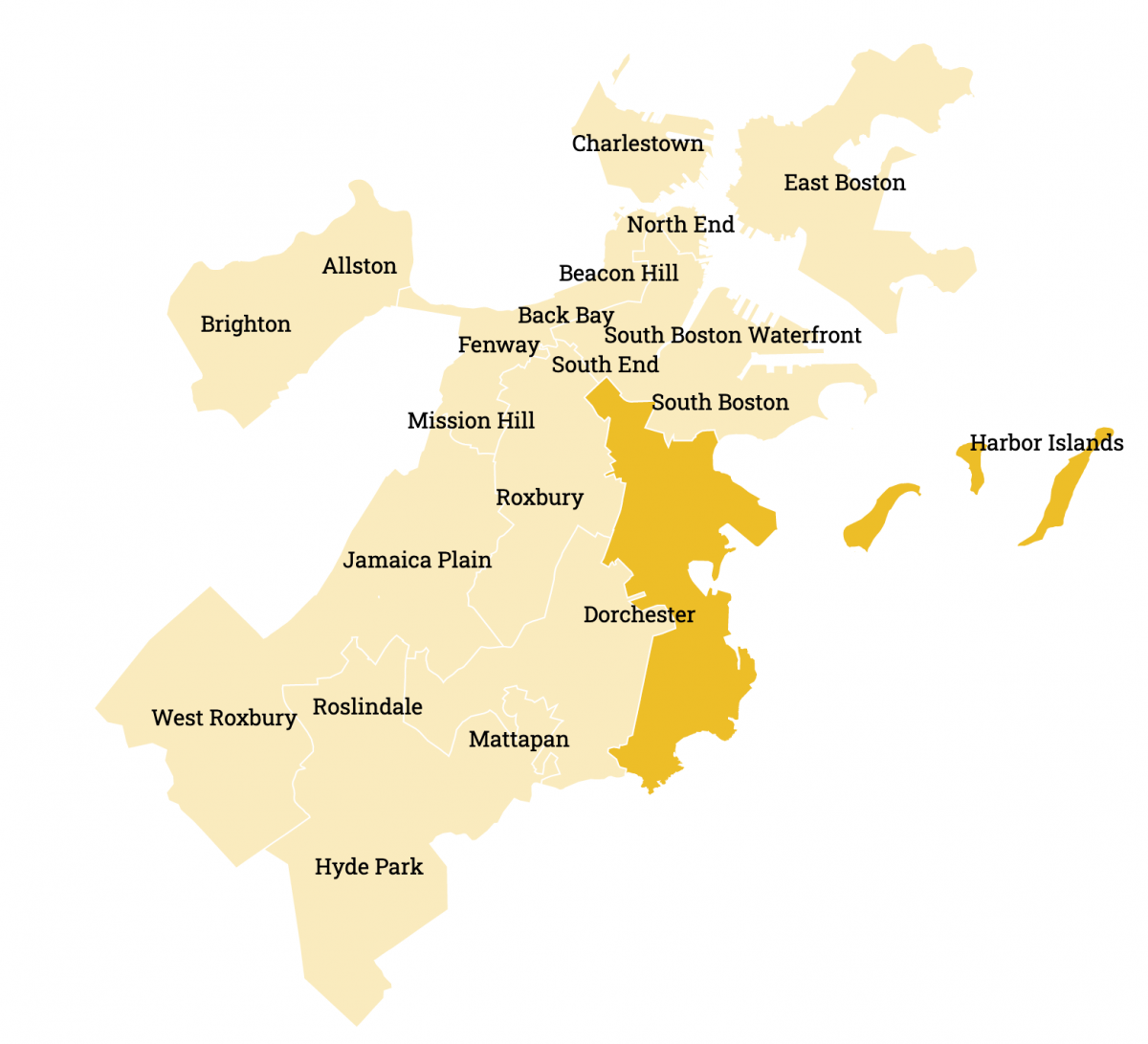
The Scope’s “District Candidates” tool created by Ha Ta.
Alt-text: A labeled map of each of the neighborhoods in Boston. When accessed through The Scope’s website, users may click on their neighborhood (i.e. Jamaica Plain, Allston, etc.) to locate all the candidates running for election in their district.
The “District Candidates” tool is an interactive map labeled by Boston’s nine districts. Users can click a defined district to find candidates running in that specific area. Comparatively, the “Find Your District” tool has users type in their addresses. Once an address is submitted, the map configures what voting district the user is in.
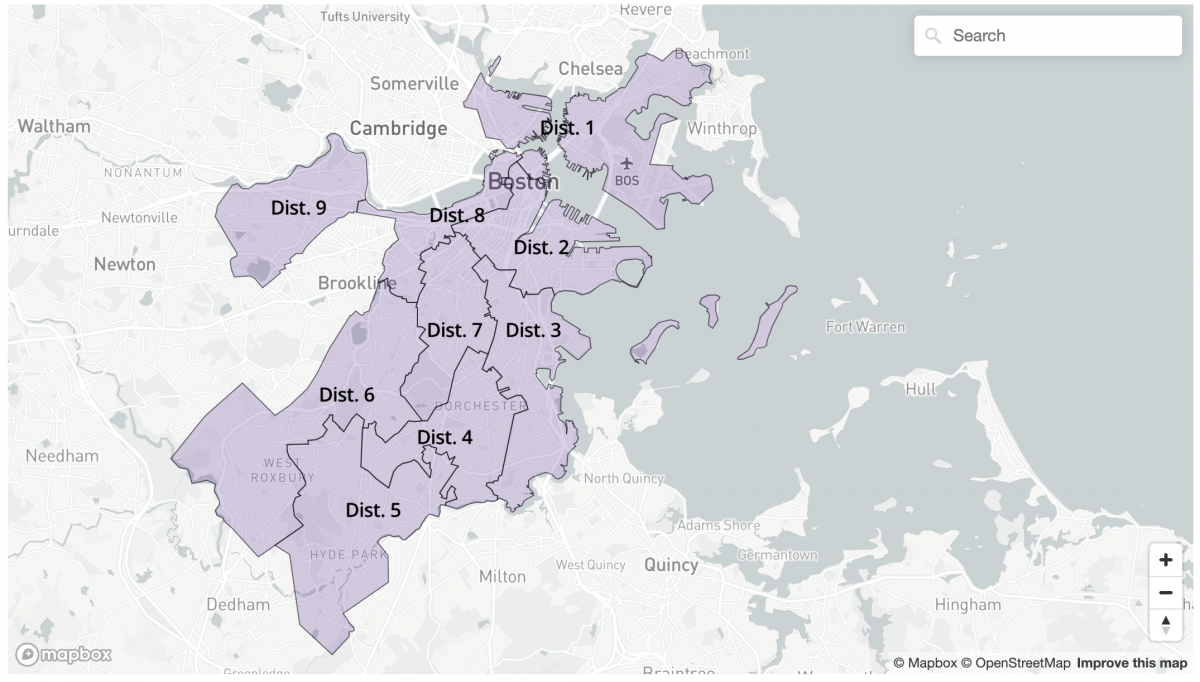
The Scope’s “Find Your District” tool created by Ha Ta.
Alt-text: A labeled map of all nine voting districts in Boston. When accessed through The Scope’s website, users may enter their address to locate their district in the search bar on the right.
When Lex Weaver, current editor-in-chief for The Scope, moved to Boston to attend the Northeastern School of Journalism graduate program, the high level of political engagement impressed her. “I found that people really care about their neighborhoods,” Weaver explained. “[But] at the same time, not everyone knows which district they live in.”
Weaver is also a Poynter-Koch fellow working to keep information accessibility front and center of The Scope’s mission.
Weaver described how the Boston political scene initially intimidated her. “To be honest, the political scene is very hard to follow,” she explained. When tackling this project, Weaver channeled her organizing background and her personal motto of accessibility.
“A lot of my work back home [in New Jersey] is educating people on why they should vote [and] why they should get involved. It seems like everyone’s really involved up here, but that’s just the surface level. People are interested in politics and care a lot about politics. But there’s still a lot of people that don’t have access to [information] and there are still a lot of people that were even more affected because of the pandemic and the existing disparities that were exacerbated,” Weaver said.
Ta, the author of the piece and former editor-in-chief of The Scope, created both data visualization maps featured. “People remember Dorchester and Roxbury, but there is a whole different system for dividing the city into districts,” explained Ta. “There are so many people running for [certain] districts that it’s hard for people to remember which district they are in. It’s also hard for people to keep track of who’s still running and who’s dropped out,” she added. Ta is also a former Poynter-Koch fellow.
In building two interactive maps, Ta wanted to create a place where voters could easily locate districts and track candidates. In addition to locating district information, voters can also learn about each candidate’s campaign platform. For example, a voter can find out which candidates share the same priorities they do. If a voter cares about education or criminal justice reform, this information is easily accessible through The Scope’s map.
“This is the basic information that [voters] will need to be able to vote for their interests,” Ta explained of the map.
The Scope initially wanted one interactive map that allowed users to locate both districts as well as candidates. Ta explained that there were some challenges that led to the creation of two distinct maps.
“In terms of data processing and designing the map, it [was] a one-person team. That makes it harder to add features because [the coding] gets much longer and harder to manage. We cannot do what other news organizations can do” due to limited capacity, Ta explained.
Ta also noted that large organizations like The Boston Globe have paywalls that help bring in more revenue and ultimately more resources for coverage and projects. The Scope does not operate under a paywall but tries to “provide the same array of information” nonetheless, said Ta.
Even though there were challenges, the interactive visuals achieved The Scope’s goal of creating easy-to-follow and accessible synthesized information pools. “Visuals are the most eye-catching. People like to feel that they still have some control and some power when taking in information,” said Weaver. “So, even if it’s just scrolling around and clicking on your neighborhood, [you] have that power to click around. You can have fun with it and decide what information you really want.”
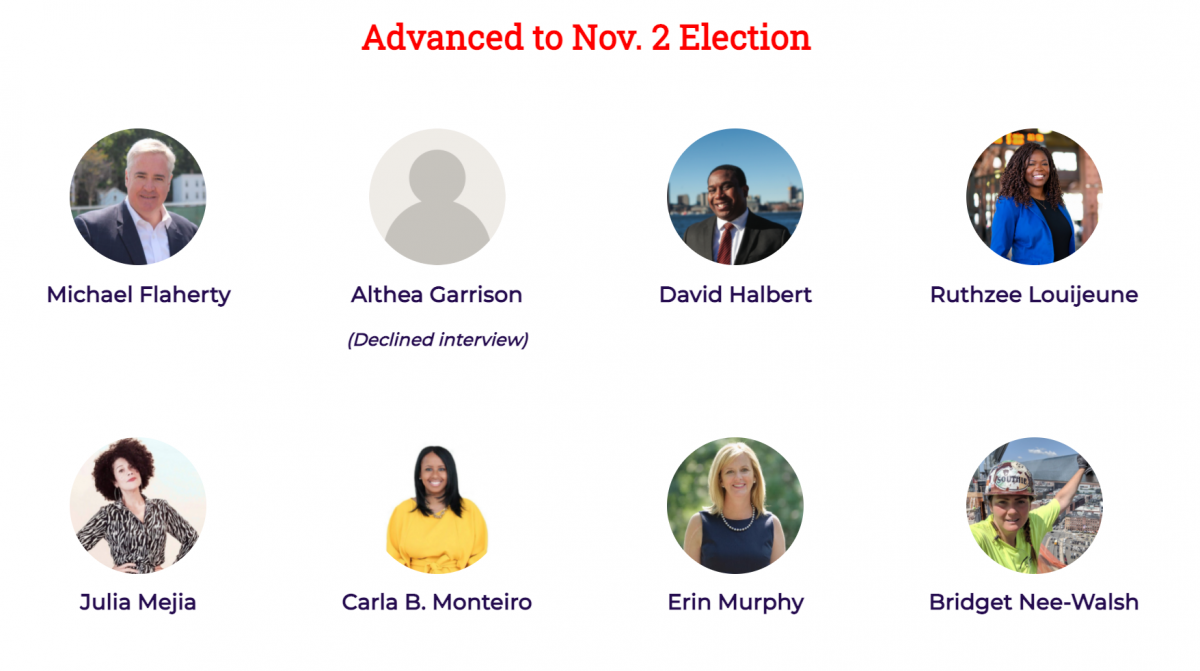
Alt-text: A heading that reads “Advanced to Nov. 2nd Election” with eight images of the at-large city councillors still in the race: Flaherty, Garrison, Halbert, Louijeune, Mejia, Monteiro, Murphy, and Nee-Walsh.
In addition to creating the map visualizations, The Scope conducted individual interviews with all 53 candidates who ran across nine districts, including at-large seats and the mayor’s race.
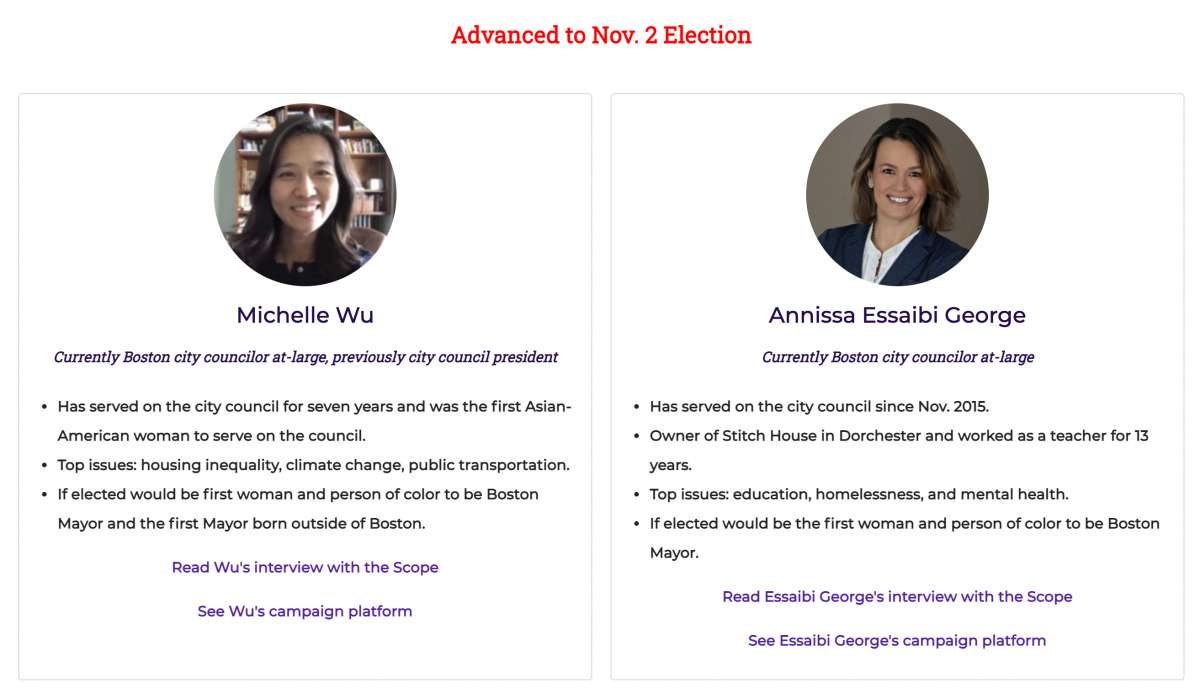
Alt-text: A heading that reads “Advanced to Nov. 2nd Election” with the two remaining candidates for Mayor of Boston: Wu and Essaibi-George.
Weaver said it is important for residents of Boston to know who their potential elected officials are and what their platforms entail beyond this campaign.
In the past, The Scope has pursued multiple projects that prioritize accessibility, like text messaging Boston-area residents directly about COVID-19 vaccine information. Navigating a language barrier is the publication’s next step. To continue with their mission of accessibility, The Scope plans to conduct in-depth interviews with newly elected officials in multiple languages.
“It’s mind-blowing to assume that everyone just speaks English. For a lot of folks here their native language is not English and it does not have to be English. So that is something that we are also working on,” said Weaver.
The Scope prides itself in community and strives to uphold its mission of providing meaningful, accessible and supplemental news for its readers.
“I think that speaks volumes. A lot of these council candidates [are running] saying that they’re for the community, they’re for the people.That’s what [The Scope does]. We’re part of the community. We’re with the community every day and it’s the community asking for this,” said Weaver.
The Boston Municipal Election is taking place on Nov. 2, from 7 a.m. to 8 p.m. Locations for polling can be found here. The Scope will continue to cover and report updates concerning the Boston election.
- How The Scope mapped their way to accessible 2021 Boston election coverage - November 2, 2021
